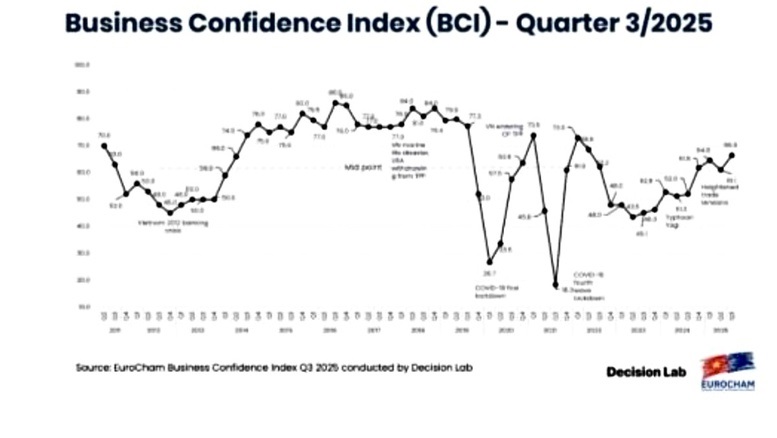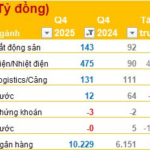
EuroCham: Vietnam Remains a Trusted Investment Destination Amid Global Uncertainty
|
European Businesses Maintain Confidence in Vietnam’s Potential
The European Chamber of Commerce in Vietnam (EuroCham) has released its Q3/2025 Business Confidence Index (BCI), revealing a strong sense of optimism among European businesses operating in Vietnam. The index reached 66.5 points, the highest in three years, surpassing pre-US tariff levels.
Bruno Jaspaert, Chairman of EuroCham, remarked: “Maintaining stable confidence in an uncertain world is remarkable—especially amid geopolitical tensions, technological shifts, and climate challenges reshaping global investment strategies.”
The report highlights that administrative reforms, green transitions, and digitalized procedures have significantly bolstered business confidence. As a result, Vietnam is increasingly viewed as a sustainable and reliable investment destination, despite global economic volatility.
Additionally, improvements in visa policies, work permits, and green investment incentives are making Vietnam’s business environment more flexible and investor-friendly. European investors also commend the government’s efforts to address institutional bottlenecks, facilitating smoother operations for foreign enterprises.
Addressing Challenges, Strengthening Long-Term Investment Position
Chairman Bruno Jaspaert noted: “80% of businesses are optimistic about the next five years, and 76% are willing to recommend Vietnam as an attractive investment destination. Notably, FTSE Russell’s upgrade of Vietnam’s stock market further solidifies international investor confidence.”
The General Statistics Office reported a Q3/2025 GDP growth of 8.23% year-on-year—a high rate compared to the region. Meanwhile, 42% of businesses believe Vietnam can achieve its 8.3–8.5% GDP growth target this year.
Thue Quist Thomsen, CEO of Decision Lab, commented: “68% of businesses expect Vietnam’s economy to stabilize and improve in the next quarter, an 18-percentage-point increase from the previous quarter. This is a positive signal for the year-end period.”
Administrative Reforms: Significant Progress but Room for Breakthroughs
According to the survey, European businesses find VAT refund and work permit processes inconsistent across localities. Many companies seek greater uniformity and transparency in implementation.
However, positive developments emerged in August 2025 when the government issued three new regulations to modernize visa and work permit rules.
Decree 219 allows online applications, reduces experience requirements, and expands work permit exemptions. Decree 221 grants time-bound visa exemptions for international experts contributing to socio-economic development. Resolution 229 extends visa waivers to 18 EU countries, enhancing Vietnam-EU exchanges.
The survey shows that 48% of businesses view these reforms positively, while 42% see their effectiveness as unclear during the transition phase. EuroCham affirms these are crucial steps aligned with long-term recommendations in its annual Whitebook.
“As Vietnam aims for high-income status, talent mobility and skill transfer are critical. Current reforms enable more flexible international expertise, driving innovation and private sector competitiveness,” emphasized Bruno Jaspaert.
Green Transition and Deepening EU-Vietnam Cooperation
Alongside institutional reforms, the green transition is a key pillar of Vietnam-EU cooperation. Approximately 50% of European businesses in Vietnam are aware of the EU Green Deal, while 43% understand Vietnam’s Green Growth Strategy.
Furthermore, over one-third are exploring the EU Deforestation Regulation (EUDR), effective in 2026. 11% have begun adjusting supply chains to meet sustainability standards—a shift toward greater transparency and traceability.
Through the Just Energy Transition Partnership (JETP), the EU has pledged €2.8 billion to help Vietnam reduce emissions and expand renewable energy. Additionally, the EU’s Global Gateway initiative—aiming to mobilize €300 billion by 2027—is channeling strategic investments into clean energy, transport, and digital infrastructure, with Vietnam as a key partner.
As a result, the green economy is emerging as a new growth driver. Around one-quarter of European businesses in Vietnam have implemented green initiatives in the past two years, such as ESG reporting, emission reduction, energy efficiency, and circular economy models.
Consequently, 42% report increased customer trust and brand value, 39% see improved operational efficiency, and 32% achieve tangible financial benefits.
EuroCham’s Chairman stated: “Sustainable development is no longer a compliance requirement but a new competitive driver. EuroCham continues to foster dialogue and share green practices through the 2025 Green Economy Forum (GEF) on November 27 in Hanoi, themed ‘Pioneering Innovation – Shaping the Future.'”
Looking Ahead: Flexible Reforms, Sustainable Confidence
The Q3/2025 BCI results reaffirm Vietnam’s position as a top European investment destination in Asia. EuroCham and the EU remain committed to advancing high-level dialogues on trade and green transition.
During his late-September visit to Hanoi, EU Commissioner for Trade and Economic Security Maroš Šefčovič affirmed: “Vietnam is a key partner for the EU in Southeast Asia. EuroCham’s insights are vital for harmonious, mutually beneficial bilateral relations.”
Bruno Jaspaert stressed: “Today’s growth isn’t enough to ensure tomorrow’s success without preparation and cooperation. This shared vision between the EU and Vietnam drives sustainable development.”
“Vietnam’s growth trajectory is impressive. However, there’s untapped potential in the EU-Vietnam partnership through transparent, internationally aligned regulations and business community consultations in policymaking. EuroCham’s role in amplifying European business perspectives—to support Vietnam’s green and digital transitions—is essential for our shared success,” concluded EU Ambassador to Vietnam Julien Guerrier.
– 08:55 15/10/2025
Credit Policies, Tax Regulations, and Housing Inequality in Vietnam
Property prices not only reflect the physical balance of supply and demand but also serve as a mirror to the equity of opportunity distribution. When credit and tax policies disproportionately favor those who already possess assets, the system perpetuates inequality, turning real estate into a hotbed for both financial risk and eroding trust.
National Energy Development Draft 2026-2030: Private Enterprises Authorized to Research and Develop Small-Scale Nuclear Power
While a standard nuclear power plant costs between $6-9 billion and takes 5-10+ years to build, SMR technology offers a more efficient solution. SMR plants can be constructed in just 2-3 years at a significantly lower cost of $2.1-3.6 billion.




















